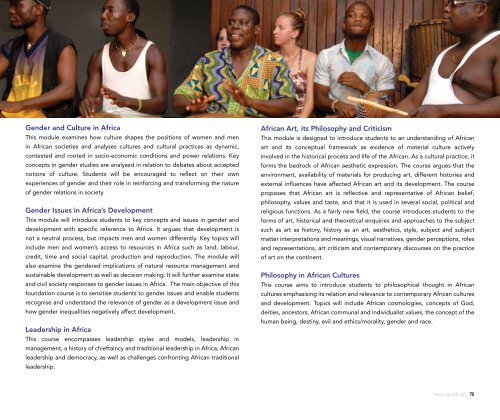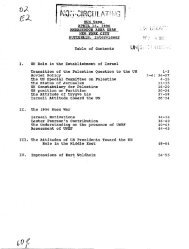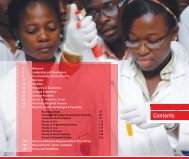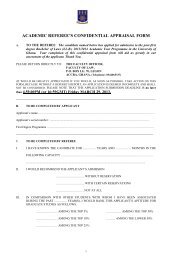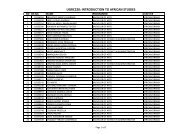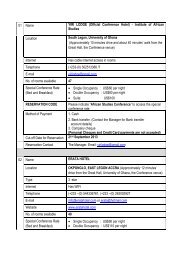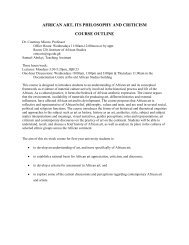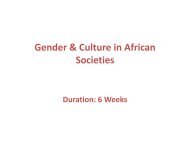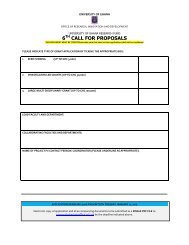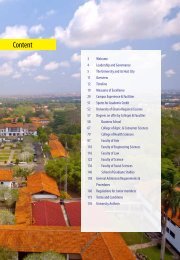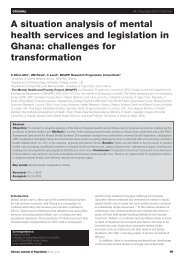International Students - University of Ghana
International Students - University of Ghana
International Students - University of Ghana
Create successful ePaper yourself
Turn your PDF publications into a flip-book with our unique Google optimized e-Paper software.
Gender and Culture in Africa<br />
This module examines how culture shapes the positions <strong>of</strong> women and men<br />
in African societies and analyses cultures and cultural practices as dynamic,<br />
contested and rooted in socio-economic conditions and power relations. Key<br />
concepts in gender studies are analysed in relation to debates about accepted<br />
notions <strong>of</strong> culture. <strong>Students</strong> will be encouraged to reflect on their own<br />
experiences <strong>of</strong> gender and their role in reinforcing and transforming the nature<br />
<strong>of</strong> gender relations in society.<br />
Gender Issues in Africa’s Development<br />
This module will introduce students to key concepts and issues in gender and<br />
development with specific reference to Africa. It argues that development is<br />
not a neutral process, but impacts men and women differently. Key topics will<br />
include men and women’s access to resources in Africa such as land, labour,<br />
credit, time and social capital, production and reproduction. The module will<br />
also examine the gendered implications <strong>of</strong> natural resource management and<br />
sustainable development as well as decision making. It will further examine state<br />
and civil society responses to gender issues in Africa. The main objective <strong>of</strong> this<br />
foundation course is to sensitise students to gender issues and enable students<br />
recognise and understand the relevance <strong>of</strong> gender as a development issue and<br />
how gender inequalities negatively affect development.<br />
Leadership in Africa<br />
This course encompasses leadership styles and models, leadership in<br />
management, a history <strong>of</strong> chieftaincy and traditional leadership in Africa, African<br />
leadership and democracy, as well as challenges confronting African traditional<br />
leadership.<br />
African Art, its Philosophy and Criticism<br />
This module is designed to introduce students to an understanding <strong>of</strong> African<br />
art and its conceptual framework as evidence <strong>of</strong> material culture actively<br />
involved in the historical process and life <strong>of</strong> the African. As a cultural practice, it<br />
forms the bedrock <strong>of</strong> African aesthetic expression. The course argues that the<br />
environment, availability <strong>of</strong> materials for producing art, different histories and<br />
external influences have affected African art and its development. The course<br />
proposes that African art is reflective and representative <strong>of</strong> African belief,<br />
philosophy, values and taste, and that it is used in several social, political and<br />
religious functions. As a fairly new field, the course introduces students to the<br />
forms <strong>of</strong> art, historical and theoretical enquiries and approaches to the subject<br />
such as art as history, history as an art, aesthetics, style, subject and subject<br />
matter interpretations and meanings, visual narratives, gender perceptions, roles<br />
and representations, art criticism and contemporary discourses on the practice<br />
<strong>of</strong> art on the continent.<br />
Philosophy in African Cultures<br />
This course aims to introduce students to philosophical thought in African<br />
cultures emphasising its relation and relevance to contemporary African cultures<br />
and development. Topics will include African cosmologies, concepts <strong>of</strong> God,<br />
deities, ancestors, African communal and individualist values, the concept <strong>of</strong> the<br />
human being, destiny, evil and ethics/morality, gender and race.<br />
www.ug.edu.gh 70


